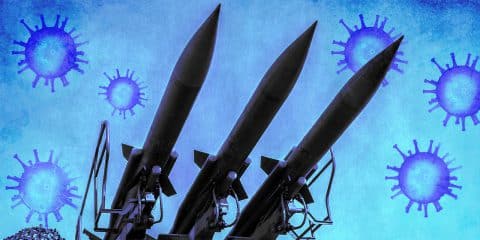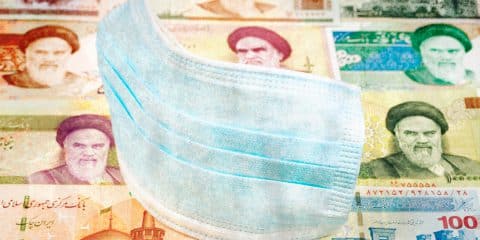Conflicts persist, and the revisionist powers continue their disruptive behavior. This includes Iranian subversion and acceleration of its nuclear project, as well as Turkey’s expansionism in Syria.
The coronavirus pandemic does not respect borders. Middle Eastern countries have reacted differently and at different times. Eventually, however, they adopted plans of action similar to those of other countries. They restricted international air travel and movement within each country, tightened border controls and adopted social distancing.
As reliable data are scarce, the dimensions of the coronavirus crisis in the Middle East are yet unclear. Countries do not know the true statistics because of deficiencies in data collection and difficulties in identifying patients with mild symptoms. Furthermore, some states in the region have sought to conceal the severity of the spread of the virus, which they see as liable to damage the legitimacy of their regimes.
Decisions taken by Middle Eastern governments in their fight against the coronavirus reflect differences in administrative capacities, medical infrastructures and specific national political preferences.
In the short term, all governments are focusing on survival of their regimes and existing societal systems. They have the ability to handle great pain and dislocation, since most of the regimes are not democratic, and their sensitivity to the suffering of their citizens is limited. The experience gained in dealing with the pandemic will improve the organizational and medical mechanisms in many countries, depending on the ability of individual governments to adapt and learn.
Presumably, with the end of the COVID-19 crisis, immediate and short-term needs will continue to receive preference over investments for the long-term future (such as how to prepare for another pandemic). This is most likely true for Israel, too. In the end, the demand that a state invest in preparations for every possible disaster is unrealistic.
In some cases, a regime’s failure to deal effectively with the virus – alongside the harsh economic realities in some countries (such as Egypt, which is facing the collapse of its important tourism industry) – may encourage Islamists to return to the political arena and try to undermine stability.
On the other hand, the internal political ramifications of the coronavirus on Turkey and Iran, which adhere to (different) versions of Islamist ideology, and which were late in responding to the virus crisis, are still unclear. There are signs pointing to an even greater centralization of power in the hands of rulers. This is true of Egypt as well.
With regard to foreign relations and security, the coronavirus has not changed much across the region, with trends underway before the virus outbreak remaining steady. This includes continuing Iranian subversion across the region and the acceleration of its nuclear project, as well as Turkey’s expansionism in Syria and its involvement in the Libyan civil war.
There is no evidence of a change in the Palestinian Authority’s or Hamas’s behavior toward Israel. Expectations of significant changes in the power dynamics in the region or the prevailing ambitions and policies of key countries in the wake of COVID-19 are, at this point, unsubstantiated.
The spread of the virus has not led to greater cooperation between countries in the region. Most of the economic and other interactions have been with countries outside the region. This has not changed. Conflicts within the Middle East have not frozen, and the revisionist powers persist in their disruptive behavior.
Similarly, the involvement of major powers in the Middle East – the US, China and Russia – is likely to continue with the same patterns. The US will continue to withdraw from involvement in the region regardless of who is elected president in November. Russia considers the Middle East to be its “backyard,” where it succeeds with relatively little investment in proving that it is a significant actor and a loyal ally.
The pandemic, however deadly, has not changed Russia’s attempts to penetrate other countries beyond Syria. China desires a more central role on the international stage and will continue to expand its influence in the region through grants, investments and PR campaigns. Yet, if we are to learn from Middle Eastern history, the asymmetries in great-power\small-state relations had only marginal influence on the behavior of local actors, leaving them much political and strategic leeway.
Economic recovery of Middle Eastern countries will depend mainly on developments in the global economy, particularly the fate of the world’s two largest economies: the US and China. Will China quickly resume buying oil from the Gulf states as it did before the outbreak of the pandemic, thereby restoring the price of oil and driving the global supply chain to activate production lines and generate jobs? When will the US market recommence the purchase of goods from around the world? The answers to these questions are the keys to economic recovery.
The end of the coronavirus crisis in the Middle East is not yet in sight. Israel seems to be beyond the virus’s peak, although some experts warn of additional waves. Should Israel ultimately emerge with a particularly good record in managing the crisis, its international image as a successful country will be bolstered. This will also contribute to the strengthening of Israeli deterrence and deferment of the next war.
* This article, published in The Jerusalem Post 08.05.2020, is excerpted from a broad JISS regional assessment which can be read in full here.
JISS Policy Papers are published through the generosity of the Greg Rosshandler Family.
Photo: Bigstock / Freepik









 - בניית אתרים
- בניית אתרים